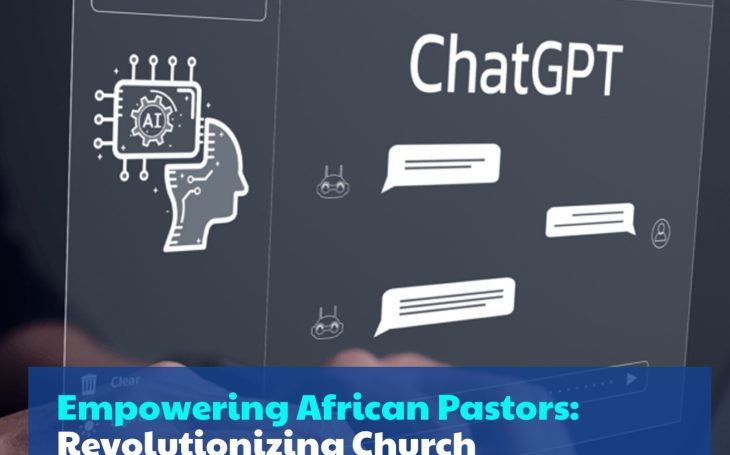How Pastors Can Harness AI and ChatGPT to Excel: Unleashing the Potential Of ChatGPT In Pastoral Duties.



Introduction:
In this blog post, we will explore the concept of Artificial Intelligence (AI) and specifically ChatGPT, which has taken the internet and technology by storm, revolutionizing various industries across the world. As a pastor, you might wonder how this technological advancement impacts your work and how you can leverage it to be more effective in your operational and managerial duties. Join us as we delve into the realm of AI, its implications for pastoral ministry, and discover innovative ways to harness its power for greater impact.
Section 1: Understanding AI and ChatGPT
1.1 The Basics: Defining AI and ChatGPT in Layman’s Terms
Artificial Intelligence (AI) refers to the development of computer systems that can perform tasks that usually require human intelligence, such as problem-solving, speech recognition, and decision-making. ChatGPT, in particular, is a cutting-edge AI model developed by OpenAI, designed to generate human-like text responses based on given prompts or questions.
1.2 The Rapid Advancements: How AI and ChatGPT are Changing the World
AI and ChatGPT have made significant strides in recent years, impacting various sectors globally. From healthcare and finance to customer service and education, AI-powered systems are transforming the way we live and work. Its ability to analyze vast amounts of data and provide accurate insights has the potential to revolutionize pastoral ministry.
1.3 The Mechanics Behind ChatGPT: Exploring Its Architecture and Functionality
ChatGPT utilizes a deep learning architecture known as the Transformer, which enables it to understand and generate coherent responses. By training on large datasets, it learns patterns and context to generate human-like text. While ChatGPT has its limitations and can occasionally produce inaccurate or biased responses, it still holds immense potential for pastors to leverage in their daily tasks.
Section 2: The Impact on Pastors and Ministry
2.1 Shaping Communication: AI and ChatGPT’s Influence on Congregation Interaction
AI-powered chatbots can facilitate real-time interaction with congregants, providing instant responses to frequently asked questions, prayer requests, and event information. By automating certain communication tasks, pastors can free up valuable time for more direct engagement with their congregations.
2.2 Enhancing Pastoral Care: AI-Enabled Support Systems and Mental Health Assistance
ChatGPT can assist in providing immediate support to individuals struggling with various issues by offering resources, guidance, and even empathy. Pastors can use AI-driven tools to supplement their pastoral care efforts, offering 24/7 availability and support to those in need.
2.3 Expanding Outreach: Leveraging AI and ChatGPT for Global Ministry
With AI’s language translation capabilities, pastors can reach a broader audience by translating sermons, devotionals, and other resources into multiple languages. ChatGPT can also assist in creating localized content, fostering cross-cultural connections and expanding the reach of the ministry.
2.4 Amplifying Sermons: AI-Driven Preaching Tools and Sermon Composition
AI-powered tools can aid pastors in researching and crafting sermons by providing relevant biblical references, historical context, and illustrative examples. ChatGPT can also generate sermon outlines or assist in refining sermon delivery, ensuring greater impact and clarity.
Section 3: Leveraging AI and ChatGPT for Pastoral Effectiveness
3.1 Streamlining Administrative Tasks: Automating Pastoral Operations
AI can help streamline administrative duties, such as managing church databases, scheduling appointments, and organizing events. By automating these tasks, pastors can focus more on pastoral responsibilities, nurturing relationships, and spiritual guidance.
3.2 Personalized Pastoral Guidance: AI-Assisted Counseling and Spiritual Support
AI-powered chatbots can provide personalized pastoral guidance by asking probing questions and offering tailored advice based on individuals’ needs. While AI cannot replace human connection, it can supplement pastoral care efforts and provide additional support.
3.3 Data-Driven Decision Making: Using AI for Pastoral Strategy and Planning
AI’s data analysis capabilities can assist pastors in making informed decisions by analyzing demographic trends, attendance patterns, and ministry effectiveness. Pastors can leverage these insights to develop strategic plans, allocate resources efficiently, and enhance ministry impact.
3.4 Innovative Teaching Methods: AI-Powered Education and Discipleship
AI can enhance teaching and discipleship efforts by providing personalized learning experiences, adapting content to individual needs and learning styles. Pastors can utilize AI-powered educational tools to facilitate Bible study, discipleship programs, and theological training, fostering spiritual growth in their congregation.
Conclusion:
In conclusion, the emergence of AI and ChatGPT presents both opportunities and challenges for pastors. By embracing this technological advancement, pastors can leverage AI and ChatGPT to enhance their operational and managerial duties, ultimately leading to more effective ministry. Whether it is automating administrative tasks, providing personalized pastoral care, or exploring innovative teaching methods, the potential for pastors to leverage AI is vast. As we navigate the digital age, let us embrace AI as a tool to empower pastors and propel ministry forward into a new era of effectiveness and impact. By harnessing the power of AI and ChatGPT, pastors can effectively navigate the evolving technological landscape, enriching their ministry and touching lives in profound ways.
User friendly and simple church management software including membership database, communications platform, event & attendance management, first timer retention workflow, & multi branch management.
About Churchplus
- Media & Brand Kit
- Careers
- Contact Us
- Become a Partner
- Campus Community
About Churchplus
- Media & Brand Kit
- Careers
- Request Demo
- Contact Us
Most Read Articles
Help & Support
- Sales or Customer Support
- Request a Demo
- Get Started for Free
- Free 500 SMS
- Frequently Asked Questions
- Churchplus Academy
- API Documentation
- Product Updates
CONTACT
United States
- Address: 220 Davidson Avenue, Sommerset NJ 08873
- Phone: +1 732 788 3571
Nigeria
- 3/5, Tapa House, Off Eric Moore, Surulere, Lagos 101283
- Phone: +234 802 373 9961
